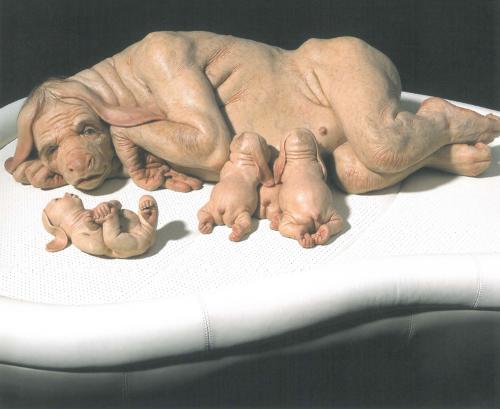
Darren Sylvester takes our emotional lives and the bittersweet futility of dreams as his subject. Reminiscent of a film or music recording, his photographs start off as a diaristic short story refined into a single image. Part fiction and part autobiography, Sylvester's images arise from texts that he composes, carefully distilled into photographs. Like lyrics on an album sleeve, a short story appears in the catalogue to set the scene. Aesthetically recalling the polished slickness of advertising, Sylvester's products are the psychological vacancy and vulnerability of contemporary existence.
Each tableau is staged and fastidiously composed or sketched on a computer before being realized as a photograph. Sylvester controls all technical aspects particularly the lighting in order to evoke a mood or sentiment. Drafted on his computer like a storyboard, the next stage consists of casting generic, anonymous characters for a photographic shoot. His working method involves careful arrangement of position, selection of clothing, resulting in an orchestrated composition. Take the immaculate symmetry of paired images We cannot live without regret and I know. It's not practical to follow your heart. She stares into the distance in front of a blank television screen flanked by CD stacks with a half-eaten pizza nearby and a beer. Like a stilted conversation, the distance between the couple is palpable in a wistful kind of way.
Narrative in content, his images are like stills from a movie or excerpts from a novel. In fact, Sylvester has written two short feature film scripts, one of which was developed by the Australian Film Commission. Sylvester's cinematic, fictive settings are artificially fabricated. He casts his characters from people he knows or from modelling agencies. 'I don't want mistakes, in skin, in colour, in arrangement, in expression, everything must be perfect, but the artworks should be about falling apart'. In doing so, he uncovers a poignant vulnerability. By choreographing scenarios, imbued with unsettling drama and potency, there is a psychological intensity. His instantly recognizable subject matter includes loneliness, futile relationships and teenage friendship mixed with motifs such as the home, car, club, fast food outlet and computers. The combination reveals our contemporary predicament of ennui.

Sylvester's sentiment is like a pop song that has a lingering quality. Here is Philip & Morris, a generic corporate couple casually slouching in their stainless steel and granite kitchen. Alienated and vacant, there is no sense of belonging for this pair. Work Day and Night Work are elegantly composed abstract image of office ceilings, each aperture like a tiny cubicle. They are inspired from a period early on in Sylvester's career when he undertook market research. Detesting this job, he stared at the ceiling thinking about the anonymity and repetitiveness of work. By contrast, For the most part humans seem ugly and annoying is a signature poetic image of a car with Sylvester sitting mournfully, waiting at dusk with the passenger door ajar. As a metaphor for journeys, the car returns us to the fumbling awkwardness of adolescence.
Sylvester's poetic titles recall slogans but they are laden with emotional content. Occasionally they verge on aphorisms such as We cannot live without regret. His large scale and high resolution photographs retain an alarming clarity. Often Sylvester's practice is linked with advertising partly due to the surface slickness and composition. Sylvester, however, likens his work to 'post-advertising': 'They show that even if I buy this product, when I get it home everything is still the same, you still only have your friends, you're still alone, you still have to work, no promise is ever kept'. Sylvester's post-advertising realm is more capacious, redolent with loss and longing. He personalises advertising phantasms with a language of consumption that is rendered bereft. While his social scenarios about contemporary existence deploy a glossy façade, ultimately, they reveal unfulfilled desires and shattered dreams.












